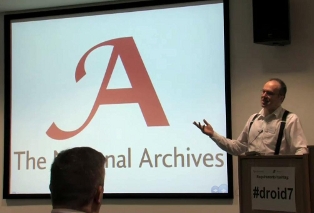Greetings from Digital Preservation!
One of the challenges we face in our department is coordinating our efforts to satisfy the requirements of The National Archives, other government departments and a wider preservation and archives sector community that make use of our tools DROID and PRONOM. With such a diverse audience we work hard to listen to colleagues who visit government departments or who actively take part in discussions about preservation and digital continuity. We also maintain mailing lists and have an email address which allows users to contact us directly. This has allowed us to develop strong relationships with organisations across the pond in the US and in the antipodes. We rely on these relationships to help develop our content and improve our services.
Over this past year we have been involved in a lot of discussion about our tools, significantly DROID, which is core to archives making preservation decisions. DROID has received a lot of positive comment but the potential for the tool and how to improve it has also been on a lot of agendas. At its heart the tool identifies digital file formats which might arrive at a memory institution. In a world of increasingly born digital records it is essential to understand what format a digital record is so that we are able to open it and continue to read it in future. What our collective wants to understand is what do we need this tool to do to help us improve the identification of formats, the speed at which we identify formats and how it reports this information. Further, what potential can we unlock in the tool as part of workflow stages that might see us report back on formats that might be encrypted or password protected; both of which might impact how we access documents in future.
To bring our diverse communities together and to open discussions about this work more transparently we held a day long PRONOM and DROID user consultation event in late November. Thanks to the Digital Preservation Coalition and the service they offer the preservation community, the day was a great success. The event featured talks about the future of both our services, efforts in our respective communities and how they might be aligned, with the day being rounded off gathering requirements that will shape the next development of the DROID tool.
Video of proceedings from the day have been released on The National Archives’ new media website here and the requirements gathered from the day can be found on our consultation wiki here. We are still actively gathering requirements and I hope the rewards of this effort will be seen later this year with the next version of the tool being released to the benefit of Government and the wider preservation communities.
Thank you to everyone involved so far and I look forward to seeing more participation to help improve these services in future.


I’m a grad student at NYU currently conducting research on video codec and container documentation. Ideally, I would like to use this research to update and expand PRONOM’s video entries. Who should I contact about this?
Thanks!
Hi Caitlin
Please email PRONOM@nationalarchives.gsi.gov.uk
Thanks
Interested to read the comments from Ross Spencer on The National Archives’ work with DROID and PRONOM.
http://blog.nationalarchives.gov.uk/blog/does-pronom-dream-of-electric-droids/
Both have come a long way since we wrote the original versions. They are both cornerstones of Digital Preservation and it is great to see such a positive future for them. They are both of course a key part of our SDB system http://www.digital-preservation.com/solution/active-preservation/managed-migration/